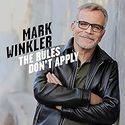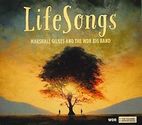|
This week's column considers the cast recording of a musical that had an Off-Broadway run last year, and releases from jazz singer/songwriter Mark Winkler and musician Marshall Gilkes.
 MILLENNIALS ARE KILLING MUSICALS MILLENNIALS ARE KILLING MUSICALS
ORIGINAL OFF-BROADWAY CAST
Yellow Sound Label/ Brainstorm Records
Digital
With an often brash, kinetic pop score that allows its characters to unburden themselves and flaunt honest feelings, the Off-Broadway cast recording of Millennials Are Killing Musicals feels like a mix of raw nerves and humor, with some sweetness. With a feminist sensibility, Its Generation Y protagonists deal with modern life, parenting, dating and insecurities. Kristolyn Lloyd sings strongly as the prominent Brenda (with major singing on 10 of the 15 tracks), a single mother overwhelmed and under pressure. The opening song has her facing the challenges of "Adulting" and expressing confidence about a more secure, happier future.
Nico Juber is the composer/lyricist. Her songs are a mixed bag, some with depth (material near the end feels the most authentic and mature) and others more underwhelming. Some suffer from overstatement and false rhymes ("We are Millennials/ It means we're ephemeral" is a line from the in-your-face "I'm Back," which also attempts to rhyme "face it" with "basic" and "Zara" with "karma." A song called "Just Like Gwyneth Did" proposes that "best" rhymes with "therapist" and that "relief" rhymes with "teeth." And what can you say about a song about tots being so clingy that their mothers are "Never Alone" in the bathroom that uses the word "poop" six times?
There are flashes of charm, such as the one titled "ILYRS," those letters standing for the declaration "I Love You, Ryan Seacrest" addressed to that celebrity and sung with an appealing cheekiness by Diana Huey as Brenda's very pregnant sister. And the song "Trigonometry" boasts a cute description of people connecting by using words related also to mathematics, handled disarmingly by Jakeim Hart. Three numbers credit others for additional musical contributions, keeping it in the family with two other Jubers (father Laurence and sister Ilsey), while vocal arranger Devyn Rush helped with "Literally the Best."
A four-member band provides accompaniment. A digital booklet has all the lyrics and credits, plus color photos of scenes with several short excerpts of dialogue, some of which is delivered by actors personifying elements of social media.
 MARK WINKLER MARK WINKLER
THE RULES DON'T APPLY
Café Pacific Records
CD | Digital
Gaze at the cover photo of Mark Winkler's latest album and he seems to be gazing at us from behind ordinary-looking spectacles, but it seems he must have, metaphorically, worn rose-colored glasses when putting together The Rules Don't Apply. As a rule, the optimism and cheer dominate and are infectious. He might as well be singing the lyric from No, No, Nanette that states "'I Want to Be Happy' but I won't be happy 'til I make you happy, too." (He's not doing that 99-year-old pep rally; the oldest numbers here are from the 1960s and most are his own later concoctions written in collaboration with various colleagues.) The repertoire celebrates the pleasures of music, love, and coasting through life in the big cities of both coasts ("Sunday in L.A." and "In Love in New York").
A bevy of heavy-swinging musicians and arrangers, in different combinations, are teammates here bringing some variety, but Mark Winkler stays in character as the cool jazz raconteur, unflappable, jumping with joie de vivre. There's some earned wisdom under the glib persona, as shared in "Lessons I've Learned" and the title song of The Rules Don't Apply which rejects the idea that opportunity for success has a shelf life.
Surprisingly, the usually relaxed-and-loose Winkler way with a song is oddly somewhat MIA with his cover of "Got to Get You Into My Life." The tempo and phrasing of the lyric feel kind of cautiously reserved on this Beatles item that Paul McCartney told his biographer he wrote about the pleasures of marijuana. More satisfyingly successful is "Something So Right," Paul Simon's touching analysis of interpersonal relationships and self-awareness.
A major highlight comes with the nostalgia and appreciation evoked in "If These Walls Could Talk (They'd Sing)," which is awestruck commentary on the experience of being in the same recording studio where iconic mid-20th century figures of music recorded. It's the best kind of name-dropping with the mentions of the greats. Literally and figuratively following in their footsteps, some of that stardust has rubbed off on entertaining, savvy Mark Winkler.
 MARSHALL GILKES AND THE WDR BIG BAND MARSHALL GILKES AND THE WDR BIG BAND
LIFESONGS
Alternate Side Records
CD | Digital | Vinyl
Although jazz musician Marshall Gilkes records mostly his own compositions, he occasionally turns his prodigious talents and taste to an old classic. In his new release, LifeSongs, with Germany's WDR Big Band, there's an exquisitely beautiful instrumental version of the grand South Pacific lament "This Nearly Was Mine" that does it full justice. It's dignified, rich and elegiac, the restrained rue intensifying to heart-pounding passion by the end. The requisite wistfulness and ache is captured in the flugelhorn playing by featured soloist Andy Haderer. As a musical theatre fan, the song title's appearance on the track list may be what catches your eye, but anything on the program might well catch your ear, as the Gilkes-created melodies are very accessible and arresting; the moods and playing are often sumptuous.
Submitted for review was the CD version with nine tracks of luxurious length (the trombone playing of Mr. Gilkes is featured on five, with other trombonists, sax men, and pianist Billy Test also prominently getting spotlight time). The aforementioned song at almost six and a half minutes actually is the briefest of those on the CD and four of the others go past the nine-minute mark. The digital release has two additional pieces and there's a two-disc vinyl set, too.
There's one vocal number, with guest singer Sabeth Pérez lending her lovely legato manner to the traditional lullaby "All the Pretty Little Horses." Several Gilkes-composed inclusions likewise instantly establish palpable tenderness, plush and pensive, at least in part. "My Unanswered Prayer" is a meditation with frustration in reaction to the tragedy of gun violence. Other beauties are reflections in response to the pandemic. I find the graceful sections the most rewarding, but the big band provides big energy and punch, too. There's the lively "Cora's Tune" (recorded twice before in other stylings), dedicated to the composer's daughter, and the aptly titled "Sugar Rush" turns up the "pow" meter to the explosive setting. Warm or wild, LifeSongs is stirring and striking.
|